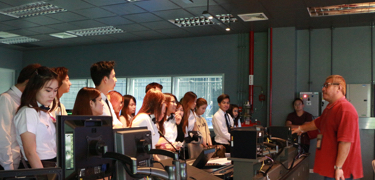ThaiPBS Organized Regional Symposium on ASEAN Media Ethics on 2014

ThaiPBS Organized Regional Symposium on ASEAN Media Ethics on 2014
The “Regional Symposium on ASEAN Media Ethics” was organized by Thai Public Broadcasting Service (Thai PBS) in cooperation with the National Broadcasting and Telecommunication Commission (NBTC) and Sukhothai Thammathirat Open University (STOU) on 8 - 9 December 2014.In his welcome remark, Director General of Thai PBS, Mr. Somchai Suwanban, stated the importance of this symposium as a platform to understand how ASEAN media practitioners work in each individual social context. Also, this symposium provided a good opportunity for participants to strengthen the regional network for the benefits of all ASEAN peoples. More than 60 participants from ASEAN member states attended in this event.
Overview report of the Projects and Outcomes of the 2013 Regional Workshop was presented by Mr. Anothai Udomsilp, Director of Academic Institute of Public Media as follows:
1. Commonalities
- Members of ASEAN media share the principles in media ethics and values.
- Attach importance to striking a balance between media freedom and responsible reporting as well as the right to know of the public.
- Agree that media should possess the right to criticize fairly and constructively
- Emphasis on making a clear distinction between factual reporting and analyses or opinion.
2. Challenges
- Media monopoly and problematic ownership structures of media conglomerates.
- Lack of capacity-buildingto catch up with new technologies;
- Lack of legal framework to regulate or prevent violation of media ethics
- Lack of reliability of information, or means to filter information.
3. Recommendations
- Increase the capacity-building for media practitioners in ASEAN.
- Establish a third-party institutions to act as watch-dogs to protect the public interest and uphold media ethics.
- Set up ASEAN-based institutions and personnel that would represent ASEAN broadcast media, such as an ASEAN Broadcasting Commission, Council, Association.
- Develop its own set of media ethics.
- Play a supportive role in the efforts towards ASEAN integration.
The report on ASEAN Media Ethics Research was presented by Assistant Professor Dr.Siriwan Anantho and research team from Sukhothai Thammathirat Open University, which covered the followings:
1. Purposes of Study
- Study and compare media ethical guidelines and media ethics regulatory framework across countries in the ASEAN region.
- Study the problems and obstacles to the compliance of media ethics in the ASEAN region.
- Explore ethical issues related to broadcasting and new media in ASEAN region.
- Find solutions/suggestions for promoting media professional ethics in the ASEAN region.
- Propose an ASEAN common framework for professional media ethics applicable for the region.
2. Research Process
- Gather of preliminary data
- Review literature and related research
- Interview the Media Academic and Practitioners around ASEAN countries.
- Organize an academic forum to present research findings and obtain feedbacks.
3. A Framework for an ASEAN Common Code of Conduct
- ASEAN media must understand and respect the differences, diversity and sensitivities related to political systems, religious beliefs and culture across countries in the region. Nationalism promotion must not affect the relationship between ASEAN countries.
- Principles of human rights should be respected.
- Plagiarism should not be tolerated in any form and intellectual property rights should be respected.
- The confidentiality of news sources must be upheld.
- Objective and accurate reporting is a must. Sensationalism which could lead to misconceptions and misunderstandings between ASEAN member countries must be avoided.
- Media practitioners who uphold media ethics must be protected against threats in all forms.
- Media practitioners should have the integrity to refrain from taking bribes or personal benefits in exchange for unethical practices.
- In light of ASEAN integration, media practitioners’ collective sense of responsibility should be expanded regionally, and not limited to only one’s own country.
Following The Report Presentations was a panel discussion on “Media Ethics in ASEAN 2015 & Beyond” by 5 panelists; namely Mr. Kavi Chongkittavorn from Thailand, Mr. Jerry M. Reyes from the Philippines, Mr. Augustine Anthuvan from Singapore, Mr. Kem Gunawadh from Cambodia and Mr. Bekti Nugroho from Indonesia. Issues of discussion included:
1. Background of ASEAN
- Signed in 2007 with three pillars; Political Security Community, Economic Community, and Social Cultural Community
- Promote the Peace, Security and Stability.
- Emphasize on Human Rights, Social Justice, Environmental Sustainability, and narrowing the development Gap.
- Encourage single market and production base, free flow of goods and services, and to assist less developed countries.
2. Media landscape in ASEAN
- Diversity and uneven region
- Poverty and uneducated is our common enemy
3. Media Role in ASEAN
- Promote and raise awareness of the sense of belongings and national identity, understand and respect each other members.
- As a single community, ASEAN can pursue closer interaction and cooperation to forge shared norms and values that would enhance the well-beings of the ASEAN Community.
4. Good Media Culture
- Separate opinions and facts.
- Maintain vision and clear editorial policy
- Journalists need to be trained constantly, learn to ask good questions and concern about awareness, analysis, reflection and action.
The first day of the symposium provided a backdrop for further group discussions by participants on the following day which will be concluded in the final report of the symposium.
